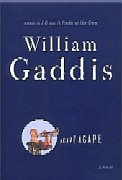|
|
 |
 |
Claro French translator of Agapē Agape/Agonie d'agape |
|
Translating Gaddis: the hidden music of Agapē Agape Translating Gaddis’ Agapē Agape was a unique and fascinating experience. It was the first time I had the opportunity to translate Gaddis. In the past, I was lucky (and crazy) enough to translate Pynchon’s Mason & Dixon, Barth’s Sot-Weed Factor and other MobyDickesque works, but this rather small opus by the late Gaddis was as big a challenge, and as much of an adventure. When reading AA for the first time, you feel that your reading is bound to be manifold: folded many times indeed. You hear a specific voice, which reminds you almost immediately of Thomas Bernhard, or even Beckett. You hear it rave, stumble, wander; it quavers, squeaks, whines; it threatens the essence of language; it is an As I Lay Dying kind of voice, full of sound and fury, the many sounds of a world ready to collapse, the ultimate fury of a mind doomed by this noisy threat. And then, there are other voices. Other minds. All interfering with the narrator’s soliloquy. Plato, Benjamin, Huizinga, Freud, Flaubert, and many others. Some are ghosts, some are hosts, but all are summoned here for a subtle parade. They are quoted, unquoted. They seem quiet but are busy. Gaddis brings them out of some cavernous hat like a tired magician, slightly afraid of the rabbit’s teeth. Because they can bite. They are still strong. Plato is still strong. And cruel. So, in order to translate all these voices, you have, of course, to recognize them. To identify the place they come from. So, I had to check all these quotations, a task made possible thanks to Steven Moore’s precious online annotations. Then I spent some time reading or re-reading the books in question. Gradually, a sort of literary galaxy emerged, with friends and foes, allies and enemies. Sometimes, it was not easy: for instance with Flaubert — I couldn't translate Flaubert into French! Fortunately, his letters do exist online . . . I wonder what Gaddis would have thought of this kind of research . . . Then, of course, there is Bernhard, whose name never appears, but whose prose is quoted several times. I re-read especially Concrete and The Loser. A very moving experience, since Gaddis discovered in Thomas Bernhard a very close doppelganger. The kind of problem one encounters with quotations: if it seems ludicrous to translate Flaubert from English to French, it is a little different if the text is translated from another language. For example: the French translation of Bernhard we have, though very good, diverges slightly from the English translation. That’s what I altered, slightly, too, the French translation, because it needed to be as close as the English one. I did the same with the excerpt from A Confederacy of Dunces, because I found the French translation too far from the original. But in all these cases, I tend to keep to the existing French translation, because it has became, rightly or not, the canon and the reader has to recognize the Bernhard he’s accustomed to reading, with just the right amendments. At last, when I had recorded all these echoes of the past, a new kind of work awaited me. I had to re-read Gaddis' novels. The Recognitions, of course. But above all, J R. Here and there, as all Gaddis’ scholars know, we can find hints of the work-in-progress not yet called Agape Agape. In my Penguin Books edition, I saw with new eyes the words pianola, Johannes Muller, agape (p.291), Türschluss syndrome, Plato/tomato, Trilby, horn and kettledrums, unswerving punctuality of chance. I cannot resist quoting a few lines:
Among other problems I encountered, there were of course the puns, especially the Pushkin/Pushpin pun. After a lot of cogitating, I finally decided to settle on this: poésie/punaise. True, I had lost in the process some homophonic relevance, but when translating puns you have to be very careful not to devise a too obvious equivalent. And then it was time to find the music, now that I had all the lyrics . . . It took time, and I had to rant and rave like Flaubert in his "gueuloir" or to whisper and stammer like some Beckettian character. I read my translation aloud many, many times, until I was satisfied (?). Usually, when you work on the final draft, you look for some fluidity. Here, the fluidity lies beyond/behind a stammering — the sentences are cropped as soon as they rise, thoughts are trampled, there is hesitancy [impedance?]. So it’s very important not to erase this well-balanced disorder. To keep the paper roll going "with the holes in it running over the tracker bar." In AA, many sentences are not completed, so you have to guess what is missing in order to cut the French sentence at the right place. Here again, it is the rhythm which is important. The breathing. And I guess, although it is not easy to explain, empathy does play a role in this process. The title, too, was a big problem – and publishers have the final word here, whether we like it or not. I had found a title I liked a lot: Béantes Agapes. " Béantes" means more or less "agape" or "gaping." But finally another title was chosen: Agonie d’Agapè, something like "dying agapè." The music is there, sure enough, but I’m not sure the meaning is very Gaddis-like. |
||||
Christophe
Claro is the author of several books of fiction, including Ezzelina,
Livre XIX and Enfilades. He is also a prolific translator
of North American and international fiction from English into French,
including the work of Laurence Gough, Michael Turner, Salman Rushdie,
James Flint, Sandra Scoppettone and Thomas Pynchon. His most recent
book is Chair électrique. |
||||
